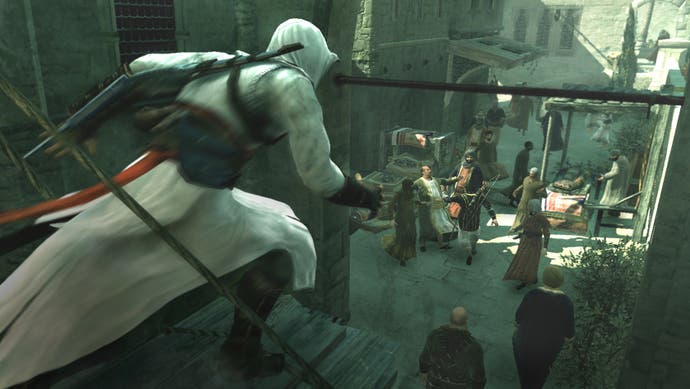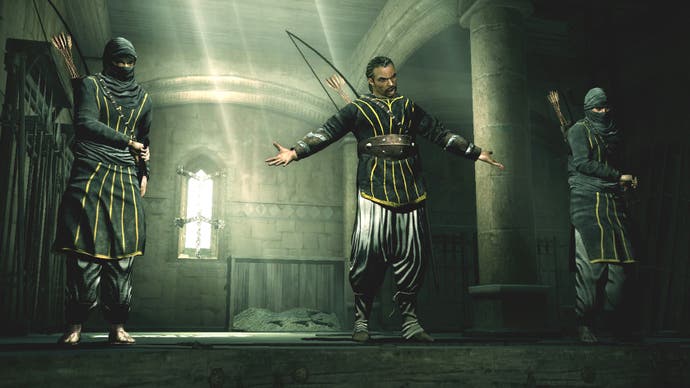Assassin's Creed
A quick hands-on with the final build.
Attention span
Within a few minutes of playing the game, it becomes clearer why Ubi felt the need to talk us through the basics. It's a game which, at first, has the capacity to throw up a few niggles unless you're willing to pay attention to what's required and don't just steam in. Simple concepts like socially acceptable behaviour while walking around and being more patient with the combat are things that could easily cause minor frustrations if you're not prepared to slow down and think about what you're doing. This is evidently no ordinary third-person action-adventure. As alluded to earlier, the whole concept of free running is fairly fundamental to the gameplay too - and, again, Ubi has changed the control emphasis in a way that makes it feel initially unfamiliar. For example, there's an unwritten expectation on the part of the player that you need to press buttons as well as the direction to perform actions, such as jumping or climbing.
The way Ubi has found around this is to simplify things dramatically with its free running concept. Essentially, Altaïr automatically navigates everything in his path by holding down the right trigger, pressing A and moving towards whatever obstacle is in front of you, such as large gap, or climbing up a wall. Once you start the action, you can let go of the right trigger and keep on bounding or climbing without the need for further button presses. Instinctively, you'll want to haul yourself up ledges, or press jump to get across a gap, but that's all been taken away. You'll still make those imaginary presses for hours afterwards, but that's gaming conditioning for you. Old habits die hard.
Having only rattled through a few basic quests and side missions, it's too early to pass an informed judgement on the game's worth, but one thing that's overwhelmingly apparent is just how beautiful the game world is. Whether riding on horseback around the more rural areas, or bounding around the dense, built-up streets, there's not a flicker of a doubt about its next generation credentials. With such ornate architecture, absolutely stunning animation techniques, and the crazy amount of detail infused into the game's sprawling openworld, this is one of the few games to emerge in recent times that you just instinctively know couldn't have been pulled off on the last generation of console hardware. Some of the design sensibilities could have found their way into older games, but the fact that Ubi has managed to not only ramp up the technical side of the game, but do so with a markedly different approach to the gameplay helps mark Assassin's Creed as a concerted attempt to do something different. To break some of the old rules, if you will.
Assassin's K.Reed

In terms of how the main assassination missions work, that's easy to explain. Like any number of other openworld games, you check out your mini-map, head for the relevant symbol and the mission kicks in. Before that, though, you'll have to find yourself a viewpoint to get an overall impression of where you are. Again, marked on the map, you simply set yourself a way point, scale whichever buildings you fancy, hop across some rooftops, scale a bit more, and eventually find yourself looking down over one of the most gloriously pretty views you're ever likely to witness in a videogame.
From there, you can usually dive headfirst down into a bale of straw, which is not only a chance for the slick engine to show off a rock-solid frame rate, but absolutely vertigo-inducingly thrilling. It's also a very quick means of getting back to ground level, where most of your missions will kick off. Side missions, like pickpocketing, eavesdropping, interrogation and carrying out challenges from informers helps get you extra information on your target - though it's entirely up to you which you decide to do - you can either find these yourself, or head to the local Assassin's Bureau (nice) and get these marked on your map for you.

The actual assassinations demonstrate just how wide open the gameplay is, leaving it entirely up to you whether you go in with brute force, or whether to go about things more discreetly. In common with Io's Hitman series, there's no right or wrong way to go about getting results, and that in itself ought to broaden the game's appeal immensely.
Even from the first couple of hours, it's abundantly clear that the game has enormous potential to figure on many people's best-ofs come the end of the year. With so much going for it, both in terms of what it offers as a technical showcase and as a demonstration of expansive, ambitious gameplay, it'll be a fun week getting to experience the whole 30-hour show ahead of the game's release on the 16th November. Sometimes, this job rules - even if it does mean living with a whole family of dustballs.
Assassin's Creed is due out on PS3 and Xbox 360 on 16th November, with a PC release to follow.
